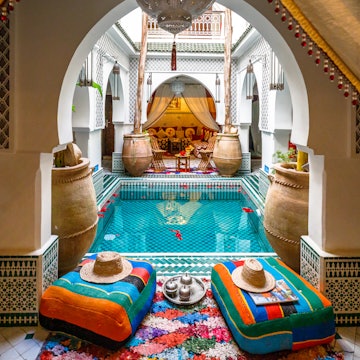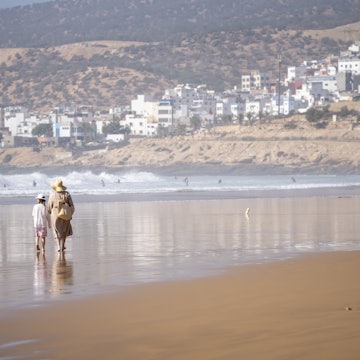

The Old City wall, Marrakesh, Morocco. Tim E White/Getty Images
While Morocco’s medinas are made for walking, the best way to experience the country’s dazzling diversity is to make like the locals and take advantage of an array of transport options to traverse its grand expanse.
Here’s our guide on how to explore Morocco in its entirety, from fabled cities and mountain villages to Mediterranean beaches, Atlantic rollers and desert outposts.
Renting a car can be a great way to explore Morocco's remote regions
If you want to get off the beaten path and explore Morocco at your own pace, you can rent everything from a compact Fiat to a 4WD, which is useful for navigating the Atlas Mountains and desert roads.
Expect to pay anything from Dh270 to Dh7500 per day, including unlimited mileage. All the major rental agencies, such as Budget, Hertz and Avis, are at Casablanca’s Mohammed V Airport and also have branches in most major cities. As always, make sure you record any existing damage and get comprehensive insurance.
Driving around Moroccan cities isn’t for the fainthearted, with bumper-to-bumper traffic, no parking spaces and a general disregard for road regulations. Neither are many mountain passes, with their hair-raising hairpin bends, and driving after dark should be avoided everywhere.
In general, major roads are in good condition. Local tour operators can provide high-quality vehicles with multilingual drivers if you’d rather relax and soak up the scenery.

Taxis are the most popular form of transport
If you’re traveling within the city limits, petits taxis – yellow in Marrakesh, red in Casablanca, blue in Rabat – are cheap and plentiful. You can flag them down on the street or find them near bus or train stations.
They’re metered, so you shouldn’t need to haggle or fix a price before you set off, but if the driver tries to avoid using the meter – telling you it’s broken is a typical excuse – ask him to let you out and try another taxi. Remember to carry cash and spare change.
For longer journeys, shared grand taxis are often the best way to get around. The vintage diesel-guzzling Mercedes are being replaced by large vans, but they still run fixed routes, leaving from the terminal when they’re full (usually six people).
To avoid a squeeze or unpredictable delay, offer to pay for more than one place or even take the whole vehicle – an inter-city trip is around Dh50. You can also negotiate to rent out a grand taxi and driver for a country-wide itinerary.
Uber is not allowed to operate in Morocco, but Careem is available in Casablanca, Rabat and Tangier.

Ride the rails on Morocco's trains and trams
The two main lines of the national rail service, ONCF, link most of Morocco’s major cities: from Tangier to Marrakesh, passing through Casablanca and Rabat, and Nador or Oujda in the northeast to Fez and Meknes. It’s budget-friendly and comfortable, even if it doesn’t always stick to the timetable.
Morocco also has Africa’s first high-speed train, the sleek Al Boraq, and you’ll whiz along at top speeds of 320km/h (200mph). Launched in 2018, it halved the journey time from Tangier to Casablanca to just over 2 hours, with stops at Kenitra and Rabat.
Both Casablanca and Rabat have modern and efficient tram services. Buy tickets from kiosks and machines at the station and validate them on the tram.
Buses can take you where the trains don’t go
Buses are a wallet-friendly way to crisscross the country. The two major national bus companies offer a reliable, comfortable service – you’ll even get wi-fi and extra leg room if you go for the “luxe” option.
CTM covers most of Morocco, with designated stops that aren't necessarily in the gare routière (central bus station), while Supratours (owned by ONCF) offers through ticketing on buses whose departure times are coordinated with the arrival of trains. If you’re going deep into rural areas, there are numerous smaller bus companies dubbed "market buses." They’re not always safe or comfortable, but they can be hailed in every village they pass through.
Tip for buying train and bus tickets: While ONCF, CTM and Supratours websites may accept non-Moroccan bank cards, it doesn't always work for international payment cards. Instead you may be better off buying your tickets in advance at the bus or train station in person – but be prepared to queue – or you can use a third-party company like Marrakech Tickets that will forward your tickets electronically for a small fee, some of which goes toward supporting local vulnerable children.
Let the plane take the strain
If you’re cash-rich and time-poor, flying can knock hours off long, dusty road trips in Morocco, although you should consider the environmental impact of doing so.
Morocco’s flag carrier Royal Air Maroc flies from Marrakesh to Errachidia – a couple of hours from Merzouga and the shape-shifting dunes of Erg Chebbi – in around an hour, compared with 8 hours by road. The more wallet-friendly Air Arabia flies between Marrakesh and Fez in an hour, shaving more than 6 hours off the bus journey.
See Morocco by motorcycle
Away from the congested city centers, the lure of epic adventures on the open road – winding through remote villages flanked by the snow-tipped peaks of the Atlas or Saharan sand – means Morocco appears on many a motorcyclist’s bucket list.
If you’re coming from Europe, you can take your motorcycle on a ferry from Spain. The quickest route is across the Straits of Gibraltar from Tarifa to Tangier. Make sure you carry a good toolkit and all the necessary spares. You can also rent a motorcycle when you arrive and hit the road solo, or join a group tour.
Accessible travel in Morocco
With few accessible facilities, Morocco can be challenging for people with mobility issues. Medina streets are often uneven and crowded, riads rarely have elevators, and accessible transport is in short supply. But the country needn’t be off limits if you rent a car and driver, choose the right accommodations and use an operator such as Morocco Accessible Travel.
Take your Morocco trip with Lonely Planet Journeys
Time to book that trip to Morocco
Lonely Planet Journeys takes you there with fully customizable trips to top destinations–all crafted by our local experts.
























